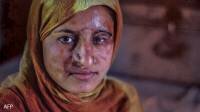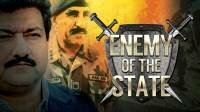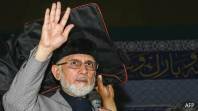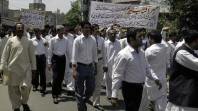By the time this report is published, perhaps the war between the two ‘giants’ of the country would be settled but the implications of this unwanted battle may last for years to come.
Six bullets hit a ‘high profile’ television anchor for the reasons, which are yet to be known. His recorded allegation that this was perpetrated by the country’s intelligence service has stirred a massive controversy in Pakistan.
Soon after the incident, the country’s premier intelligence agency, which is the first line of defense for Pakistan and a symbol of safety for the nation’s strength and stability,has been made a target of a ‘public campaign’ by the media house affected by this unfortunate incident.
This is something this country has never witnessed before. Journalists have been killed in the past, but never before these incidents have been projected as a cause for leveling allegations against or to defame Inter-Services Intelligence (ISI) publicly, so directly.
There is no denying that such incidents have occurred in the past and there was a ‘tongue in cheek’ squabble too but nobody in the past used such incidents to provide the enemies of the country a chance to get their ulterior motives against armed forces of Pakistan fulfilled.
Mr. Hamid Mir has undoubtedly been one of the ‘celebrated’ journalists in the country. He is considered as a professional and a voice for setting standards. Currently, he is on the payroll of Geo News channel, which is considered as leading the competition in private news channels in the country. They have played a role in projecting the ‘positive image’ of the country, yet there are ifs and buts in this entire episode, as it has unfolded.
The questions are; If Hamid Mir is a true Pakistani and is a dedicated ‘honest’ professional and his channel Geo is a beacon of change in the society than ISI too is a committed national security agency, which is dedicated to defending Pakistan against all inside and outside challenges.
The agency can perhaps be rough, perhaps strong willed, but it cannot kill ‘innocent’ countrymen for nothing. No national intelligence agency likes to kill its ‘own people’ by committing such cowardly acts as allegedly proclaimed by the journalist. This is especially true for a secret agency like ISI, which is fighting a multi-dimensional war to get this country out of security chaos created by the enemies of the state. It is hard to imagine that in the middle of the global war, which Pakistan is facing, the ISI would indulge in such acts that may put it in such a tainted position.
If Hamid Mir and his brother Amir Mir think that it’s ISI, which masterminded and executed this attack, then there has to be a solid reason behind it? Considering the fact that other than his statement there has been no evidence shared to date with the law enforcement agencies and that secondly it is also important to raise the question as to why would Hamid Mir feel threatened by the ISI if he has never been involved in anti state activities?
Whatever it may be, no television channel or media outlet has a right to level allegation against a state institution or blame somebody so outrageously for such a heinous crime as attempted murder, without evidence. No media pundit has a right to demand resignation from the country’s chief spy on the basis of assumptions alone, without answering some tough questions. Most importantly it is necessary for media opinion makers leveling such allegations to understand that they can have serious repercussions not only for them but also for national security.
It’s true that Hamid Mir had stated publicly that he had allegedly received ‘threats from certain quarters’. Writing for this magazine last month, he penned: “Recently the Tehreek-e-Taliban Pakistan (TTP) issued an edict against some media organizations. “This edict was given by Mr. Khalid Haqqani, the deputy chief of the TTP.” Hamid Mir said that the TTP leader had especially decorated ‘this edict with pictures of the two journalists he hates the most: one is the famous columnist Hassan Nisar, and the other is myself, Hamid Mir.’
“This is not the first time that the TTP has threatened me. They sent me a detailed threatening letter in 2012, when I took a stand against them after they attacked that young campaigner for education, Malala Yousafzai, in Swat,” he had stressed. “A few days after their threats a bomb was planted under my car and the TTP accepted responsibility for planting the bomb.”
“The TTP is not the only threat for me and other independent journalists. We are also, and more worried about the double games played and the threats posed by our security agencies.”
He was of the view that the threats to journalists came from various quarters and had lamented that, many times, it was allegedly the ‘security agencies’ that “kidnapped and killed our colleagues, but they blamed the TTP for it. Both the TTP and our security agencies are enemies of media freedom.” His view was that the “TTP pressurizes the media by accusing us of being anti-Islam and the security agencies (try) to dictate to the media in the name of patriotism, and when we refuse to listen they declare us ‘anti-state’ through their proxies in the media.”
He had gone on to support this with his own experience and he had said that, “take my case as an example. I was (allegedly) kidnapped by the ISI in August 1990 just because I filed a story for the Daily Jang saying that the then President Glulam Ishaq Khan had decided to dismiss the government of Benazir Bhutto.” He went on to claim that every time he reported on matters such as non deliverance of aid to Neelum Valley affecttees by the army to raising the issues of missing persons to protect the human rights of Pakistanis he was blamed as an anti state element and the enemy of the state, while he was just doing his duty.
“My explanation was considered to be an act of defiance.” He had alleged that it had resulted in ‘an attack’ on his children when they were going for their tuitions in Islamabad. That attack, so totally below the belt shattered my nerves, but that was not the end, he said.
He argued that it was the ISI who tried to involve him in a murder case on the basis of a recorded telephone conversation between him and some members of banned outfits. He said that he was victimized as “many colleagues started a media campaign against me, under pressure from a ‘Naval officer posted in the media wing of the ISI,’ but despite all this he maintained that “nothing was proved against me in any court of law.”
The question remains why Hamid Mir did not take the matter of these alleged attempts by the ISI to implicate him, to court or attempted to get relief from the competent authorities? Why is it that all these ‘heroic’ attempts made by Hamid Mir for journalism were made under the public eye through the media but not through the authorized channel of getting relief through the justice system? He again referred to an incident when he had received some threatening text messages on his mobile phone, which he had made public. This had led to the parliamentary debate on the subject of threats, contended Mr. Mir.
A debate was started in the national parliament on the subject of threats to the media. Supporting his own version he had narrated that after a few days “an ISI official visited me and apologized for the individual acts of some officers”. He said the threats were, “the act of some individuals but the whole institution does not think like that.”
“Credible sources informed me that powerful officials of the ISI thought I was a security threat because I was highlighting the missing persons issue. Being worried on the issue he leveled his apprehensions and stated that, “they wanted to eliminate me in a road accident. I was forced to change my residence and my vehicles. I did not press the matter because some senior ministers told me very clearly that they could not help me.”
Commenting on the less than perfect work of the special committee of the National Assembly, formed to investigate the threats to the media he said that it submitted the detailed report to the Speaker of the house on March 13, 2013, but “there was no mention in the report of any investigation of the threats made against me.”
He believed that journalist in Pakistan faced not only threats from local agents such as intelligence agencies and TTP but also foreign intelligence agencies. To support his this claim he had narrated yet another incident that when he had reported on the activities of Blackwater, the-then US ambassador Anne W Patterson wrote “a letter against me and my fellow anchor Kamran Khan to the management of my television channel.” Recently, he claimed that he had told the management that “Zaid Hamid, the head of one anti-democracy think-tank tried to hire a person to kill me”, informed him This ‘fanatic’ is “well known for his links with intelligence agencies”, he said.
The list went on to document the long list of the threats he had received due to his allegedly upright reporting. These included threats from the political parties to religious groups, mentioning the court verdict of Wali Khan Babar he said that when he did a program on the court verdict that some MQM workers were involved in the killing, “the MQM leader Altaf Hussain was angry with me.”
His view was that people believed that the journalists were very strong in Pakistan but the fact was that since a year he had not slept in one place for more than one night.
“I am not living a normal family life, only because I am a journalist. If I am living a miserable life in the capital of Pakistan then think of the hundreds of other Pakistani journalists who are working in other areas of conflict … they are more vulnerable than me. What should we do? Should we quit this profession? No! We will not, because our readers and viewers are our biggest strength. The people of Pakistan are the best judge.” Journalists including Hamid Mir faced security threats from the multiple quarters like intelligence agencies, militants and ethnic parties. So the question is why all guns were in the end turned to one source the premier intelligence agency of the country. This includes also the systematic campaign run by Geo not just Hamid Mir, when they themselves were of the view that the threats to them are varied and multiple in nature?
Within minutes of the occurrence of the event the channel had started airing the Director General (DG) ISI’s picture as the alleged, the prime offender, actually like a criminal with demands of his resignation from the office! The ISI was singled out but the question is, on whose behest?
Mr. Mir himself had explained and declared that he was at odds with the security agencies on the issue of Baloch missing persons and this could be the basis of rivalry with the ISI but as according to his own admission he had received death threats from number of sources ranging from MQM, TTP to Zaid Hamid. How could these other parties be exonerated from the suspect list like TTP, MQM or any third party who would like to get benefit of this rivalry within seconds by Geo.
Maybe things are not what they seem and maybe the actual perpetrators are some quarters beyond borders, the enemies of the state who have planned and executed the whole operation! Could it not be someone in RAW, KHAD, Mossad or even CIA?
There are various dimensions to this issue. Even if we buy Geo’s stance that ISI is the sole agency responsible for this attack, the matter could not have been concluded and blamed assigned within seconds. The truth will surface and the matter will stand resolved but it has come at a great cost to the freedom of expression!
There is no denying that our agencies are almost crude while handling the media but it’s also true that our media is also not exercising its freedom the way it should be exercised and is stepping beyond its mandate.
There is no country on earth, where the media maligns its own army and intelligence services within minutes of an attempted murder, especially in a country, which has been at war for the last thirteen years. Of course there is criticism everywhere in the world but nobody targets institutions as directly as we do in the Islamic Republic of Pakistan.
Our agencies don’t have the best track record in the world when it comes to violation of individuals’ rights. They have been known to kidnap and torture suspects in the past. But who were these people who are ‘picked up’ by the agencies? Were they anti-state elements? Were they running camps to train terrorists? Were they plotting to kill innocent Pakistanis? Were they organizing meetings and conventions to convince people to take part in terrorist operations? Were they involved in terrorist and suicide attacks themselves?
If the answer to any of these questions is yes, then we must take into account that if and when these people are put before the judicial system, they are acquitted in most cases simply due to a lack of concrete evidence. Once they are released, they go back to their old tricks and even more innocent people are killed. In neighboring India, the United States and the UK, the media and the state keep national interest paramount and work together to ensure that no foreign threats to their sovereignty are ever successful.
Why is it that safeguarding and protecting our national institutions is considered a sin? This is the time for journalists’ bodies and media unions to intervene. Call a meeting of all major media houses, key security leaders and the relevant government officials to form a code of conduct to allow the media to work for the nation and for the greater national interests, not the other way around. Freedom of expression is an essential for any democratic country, but the judicious use of this freedom, with responsibility is the key to the stability of democracy and the country itself.
Freedom of opinion doesn’t mean that we should be able to air propaganda against any individual or institution, irrespective of who they are, without any evidence. Similarly, differences of opinion must not be addressed with bullets.
The writer is a journalist based in Islamabad.




















